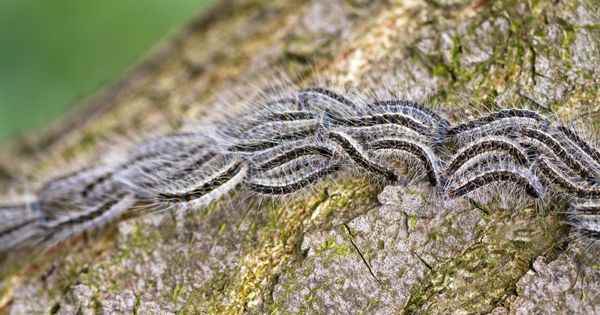This year, the processionary caterpillars are particularly numerous. Numerous cases of infestation have been reported, particularly in the north and the Grand-Est of France.
The Regional Health Agency (ARS) of the Grand-Est has informed that the processionary caterpillar has returned to France for a few weeks. Particularly spectacular invasion, since these animals can destroy in a few days all the foliage of a tree that they colonize. Some forests can be “stripped” in a few days.
A caterpillar with stinging and volatile hairs
Particularly stinging, this caterpillar should be avoided. It is not only necessary to avoid handling them, but also to move away from the places where they reside, because their hairs are extremely volatile. These caterpillars are not only present in woods and forests, but we also find traces of them in urban spaces, gardens, parks and private spaces.
The hairs of processionary caterpillars cause inflammatory reactions on the skin which can then present “redness, itching, skin pain, edema localized, urticaria and sometimes small blisters“Indicates the National Agency for Food, Environmental and Occupational Health Safety (ANSES), but also affects the eyes (conjunctivitis, tearing, eye pain) or the respiratory tract. Some people can be particularly sensitive to it and then present serious forms of reactions linked to contact with these hairs of the processionary caterpillars.
Extremely volatile, the hairs can also affect people who have not been in direct contact with processionary caterpillars.
The ARS advises that you should absolutely not approach these caterpillars, or even touch their nests. You should also avoid walking in infested places and avoid drying your laundry outside, especially when the wind is blowing stronger. Wear protective clothing when mowing your lawn and thoroughly wash vegetables and fruits in your garden.
How to relieve the symptoms?
Skin contact : wash your skin with plenty of soap and clear water in a shower. You can also remove most of the hair using duct tape. “Medication antihistamines can relieve itching. See a doctor if you have a strong rash”Warns the ARS.
Eye contact : Rinse your eyes with clean water, preferably “in a doctor’s office”.
Contact with respiratory tract : consult a doctor who will prescribe a treatment adapted to the symptoms.
Ingestion of body hair : Drink a full glass of water. You can also try to remove the hairs from the mucous membrane of the mouth “by scraping carefully with a spatula or a compress or by“ depilating ”them with adhesive tape” proposes the ARS .
What to do in case of exposure and symptoms?
The ARS recommends, in the event of mild symptoms, to refer you to your pharmacist or general practitioner and to contact the 15th only in the event of the appearance of “serious signs such as vomiting, feeling unwell, dizziness, difficulty swallowing, difficulty breathing, or severe eye damage. ”
.
dts8
